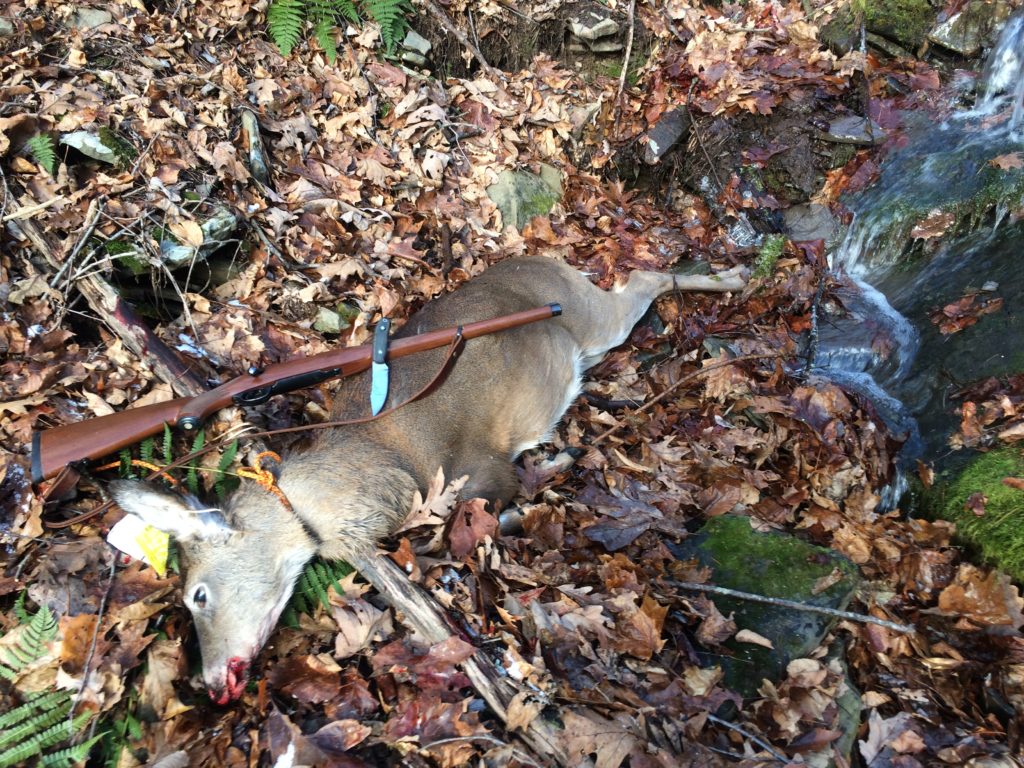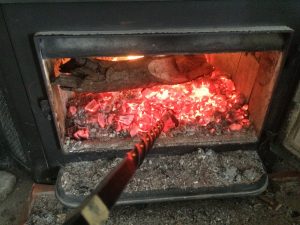Posts Tagged → firewood
What Father’s Day means to me
When I was nine, my dad gave me a set of small Norlund axes, which I still have today. One was single bit, the other was double bit. My specific job with those was to chop and stack firewood all summer, until Dick Fye’s lumber mill stopped sending us slab wood by twenty-ton dump truck loads dropped in our yard.
Dad also gave me use of the chainsaw, which I probably used as much as he did, or more. By twelve I was felling substantial trees. Probably not expertly, but I am still here today, unscathed from that, so I must have been really lucky or pretty good.
Point being, that one of the most important roles that a father can perform is to raise his son(s) to be not just men, but manly men. Masculine men, as defined by all of the masculine things manly men have done since the emergence of our species. Historically, men defended their families and communities, and hunted food that provided for their families. Those are still critically important roles for men to fill. Today, running a chainsaw, correctly using axes to split and shape wood, hauling firewood, supplying your family with sufficient firewood every day from an early age, these are all traditional manly things that can still be done in modern times. Or you can do the updated sedentary society equivalent.
Yes, I am sure that there are plenty of women who can run a chainsaw and split firewood, and who also enjoy doing these things, and although they are far in the minority of women, I say good for them. But today is Father’s Day and we are focused on the male species X chromosome humans right now, fathers and their sons (which of course applies to the masculine gay men I know). And so I say Thanks, Dad, for raising me to be a masculine man capable of doing traditionally masculine things. My family depends on it, and beyond that America depends on manly, masculine warrior men in the military to defend us from our enemies. Only dads can provide that upbringing.
Thanks, Dad!
(about the memes below: I am sick and tired of being falsely badmouthed and assaulted and coerced and demanded and forced and threatened over someone else’s sexual preference or identity or what-have-you. The truth is that I do not care, and it is my individual right not to care, and to be left alone to not care, and to say F*** off if someone keeps pushing something I don’t care about in my face and demanding that I care, and it is also my individual freedom and right and natural instinct to be repulsed by certain behaviors that other people do, and to be naturally phobic of those behaviors. And so I am just throwing up a few memes to provide my own pushback, even if I do not necessarily agree with 100% of each one. Go ahead and be offended, I do not care. I myself have been offended by this nonsense for years and no one seems to care, so back atcha).
Father’s Day
Today is Father’s Day, the day we celebrate our dads, the people who helped us grow into young men and women. For thousands of years, fathers have been the protectors and providers for their families, and they have traditionally been the source of life-saving wisdom and decision making. The lessons and skills they teach their children, especially their sons, are essential for living life properly.
Thank you to my dad, for teaching me to use a chainsaw and an axe from a young age. For giving me the childhood chore of splitting and stacking firewood all summer long, so that our family would have heat and comfort all winter long. Other chores included weeding the garden and shooting pests like chipmunks, squirrels, and groundhogs, all of whom could easily do tremendous damage to the garden in just minutes. And while these chores trained me in self-reliance, hard work, and planning ahead, it was the one thing that dad would not let me do that probably shaped me the most.
Although my dad comes from a hunting family, he himself did not and still to this day does not hunt. Oh, he appreciates wild game and will eat it over everything else, given a choice. But when I started taking my BB gun on deer hunts with neighbors at age eight, my dad always told me I had to get close to the animal to shoot it. As I grew into a young Indian or frontiersman out there in the wilds of southern Centre County, I was prohibited by dad from topping my rifles with scopes. Only open sights were allowed. He said using only open sights taught me woodcraft, requiring me to get close to the wild animals I wanted to harvest, before taking their lives.
“It is only fair,” he said. “You can’t just assassinate unsuspecting wild animals from hundreds of yards away. If you hunt, you must be a real hunter. You must get close and take the animal with skill, on its own terms, where it can see, hear and smell you. That is fair.”
And so last deer season, on a steep hillside deep within the Northcentral PA state forest complex, all of those lessons and preparation came together in one quick, fleeting second. I did the Elmer Fudd thing all alone, quietly sidehilling into the wind, trying to live up to Dad’s dictum. One cautious, slow step at a time. Eyes scanning ahead, downhill, and especially uphill. Ears on high alert for any sound other than the wind in the leaves. Big bucks that are bedded down high above where the puny humans might slip, stumble, and walk, are most likely to flee to higher ground when one of us Pleistocene guys shows up too close for comfort. Deer might hear or smell us coming a long way off, or they might see us at the last second because we are being quiet and playing the wind right, but they know that within a hundred yards or so, we can kill them. So they flee uphill, and in stumbling up against gravity and slippery things underfoot they give us shot opportunities we would not otherwise have.
And so when the strange <snap> sounded out ahead of me, just over the slight rise that led into the large bowl filled with mature timber and rock outcroppings, and an odd looking animal bolted down hill almost bouncing like a fisher, I quickly backpedaled.
Anticipating where the deer would emerge about 130 yards below me, I quickly and also carefully walked straight backwards to where a natural slight funnel in the ground provided a clear enough shooting lane down through the forest to a small stream bed. Anything passing between me and the stream would be broadside at moments, providing a clear shot through heart and lungs if I took careful aim.
And sure enough, the big doe filled one of those spaces so briefly that I don’t even recall seeing her. All I do recall is how the rifle butt fit carefully into the space between the backpack strap over my shoulder and the thick wool coat sleeve, and how the open sights briefly aligned with her chest. The thumb safety had been snicked off already without thinking, and the gun cracked. I fired the gun instinctively.
Quickly raising the binoculars to my face, the doe was clearly visible way down below me, lying fully outstretched on the forest floor just above the stream bank, like in mid-leap with her front hooves and rear hooves completely extended ahead and behind, except she was not moving. She was laying still, her neck fully stretched out on her front legs like she was taking a nap. I watched her tail twitch a few times and then knew she was dead.
Sliding on my butt down to her was more challenging than climbing up to where I had been still hunting her. Northcentral PA mountainsides are the most difficult terrain for humans, in my experience. It is topped with a layer of slippery leaves, then wet twigs and branches waiting underneath to act like oil-slicked icicles, ready to throw a boot way ahead of one’s body. If the wet leaves and branches don’t make you fall down, then the rotten talus rock waiting underneath the leaves and twigs will slide, causing you to either do an extra-wide wildly gesticulating split, or fall on your butt, or fall on your back.
So I scooted downhill to the doe, tobogganning on my butt on the slick forest floor, cradling the rifle against my chest, keeping my feet out ahead of me to brake against getting too much speed and hurtling out of control.
Arriving at her body, I marveled at how she resembled a mule. Her long horse face and her huge body were anything but deer-like. Her teeth were worn down, and she must have been at least five years old. The single fawn hanging around watching me indicated an older mother no longer able to bear twins or triplets. This old lady had done her job and had given us many new deer to hunt and watch over many deer years.
Normally, in such remote and rugged conditions I will quickly bone out the deer, removing all of the good meat and putting it in a large trash bag in my backpack, leaving the carcass ungutted and relatively intact for the forest scavengers. But this doe was so big that I just had to show her off to friends, and so after putting the 2G tag on her ear, I ran a pull rope around her neck and put a stick through her slit back legs, and began the long drag out.
This hunt has stayed with me almost every day since that day. I think about it all the time, because it was so rewarding in so many ways, and emblematic of being a good hunter. Not the least of which was the careful woodcraft that led up to the moment where the smart old doe was busted in her bed and then brought to hand with one careful shot as she loped away, far away. Just as easily I could have been a hunter clothed in bucksin, using a stick bow and arrow five thousand years ago.
Thanks, Dad, for all the good lessons, the chores, the hard work, the restrictions and requirements that made me the man I am today. Without your firmly guiding hand back then, I would not be the man I am today. And what kind of man am I? I am a fully developed hu-man; a competent hunter with the skill set only a dad can teach a son, even if it takes a lifetime.
[some will want to know: Rifle is a 1991 full-stock Ruger RSI Mannlicher in .308 Winchester with open sights. Bullets in the magazine were a motley assortment of Hornady, Winchester, and Federal 150-grain soft points, any one of which will kill a deer or a bear with one good shot. Binoculars are Leupold Pro Guide HD 8×32 on a Cabela’s cross-chest harness. Boots are Danner Canadians. Coat is a Filson buffalo check virgin wool cruiser. Pants are Filson wool. Backpack is a now discontinued LL Bean hunting pack, most closely resembling the current Ridge Runner pack. Knife is a custom SREK by John R. Johnson of Perry County]
It’s that time of year again
Plenty of things have gone to hell in a hand basket over the course of the last four or five decades, and I would only be living up my highest and bestest reputation as a grouchy curmudgeon if I ticked them all off here as a laundry list of petty grievances. But other writers and commenters have already done all that, much better than I can, so I am going to mention just one frustration. And it must be credited to that mild mannered conservationist Aldo Leopold, who first put his finger on this, on the very beginning of what ails us Americans today.
If I read one more time the overused phrase “In a Sand County Almanac, Aldo Leopold writes…” I am going to scream. You are there and I am here on the other side of the screen, and we cannot actually hear one another, so it will sound like a silent scream, but rest assured, it drives me nuts and right now I am doing my best silent scream imitation about this. Sure, it is a testament to how inspiring Leopold was and still is that so (so) many people begin all kinds of talks and writings and poems with this opener, citing some comment or observation Leopold made back in the crusty 1940s Dark Ages that yet, surprisingly, has so much application and salience today, eighty years later. But it is so very much overused to the point where it is almost maudlin to hear it used yet one more time.
And then, when I think of those intervening eighty years, well, they have been both a blessing and a curse, haven’t they, and so I find myself in that recognizably similar frame of mind…
So what the hell.
In Aldo Leopold’s A Sand County Almanac, he talks about cutting down a large oak tree with a crosscut saw, and how much history is gliding by as the saw blade traverses across the tree stem. For every few growth rings that are sawn, Leopold lists various wars and human milestones, scientific achievements as well as natural science moments, as the blade cuts deeper. Just that description alone is a pretty cool writing achievement by Leopold. It is a symbol and image that so many people have trouble forgetting.
But then at the end of the essay, just when the reader thinks “Yeah, I suppose cutting fire wood is more symbolic and meaningful than I thought it was, guess there’s a lotta history in those old oaks at Grandpa’s farm,” Leopold suddenly gets to the whole raison d’être of his history lesson (and I am closely paraphrasing here):
“I knew Americans were eventually doomed to cultural rot and failure when we discovered that heat came from a small switch on the wall, and not from cutting our own firewood every year.”
Here in the middle of his gentle outdoor lullaby, Leopold lamented the ease of life that had arrived with then-modern conveniences and services. He saw them as a two-edged sword, cutting both ways, for and against, because working hard for something, especially for your own ambient heat in the dead of winter, is an important lesson about how all humans are in truth part of the natural cycles around us all the time. Participating in these cycles humbles us, brings us into the actual healthy swing of things around us, helps integrate us with the earth’s natural vibe, tune, and wavelength, each of which we ride every moment of every day, even if we are unaware of it. And thus, it helps us thereby appreciate the natural world that sustains us every day. Even if we are unaware of it.
Leopold was advocating for Americans living newly cushy lives devoid of physical challenges to get the hell off their asses and live in the real world, to take responsibility for their own needs and not outsource everything (like the Romans did at their end). Cut their own firewood, grow a garden, shoot a grouse for dinner or a catch a fish for lunch. The ability to be self-reliant is not only an American trait from our frontier days, it is innately tied to all successful human cultures at all times.
Mind if we switch here to someone on the other side of the spectrum from our mild naturalist and wildlife biologist Aldo Leopold, who nonetheless expresses much the same sentiment?
“I hate luxury. I exercise moderation…it will be easy to forget your vision and purpose once you have fine clothes, fast horses, and beautiful women. [All of which will result in] you being no better than a slave, and you will surely lose everything.” — Genghis Khan (brutal conqueror of the entire known world in his time).
As that completely successful “mad butcher” said it, luxuries make humans soft and weak. Hard work makes us strong and successful. If there is a hallmark of modern America, it is that we are awash in luxuries and conveniences, to the point where the younger generations have no idea how we arrived here at this point, how much sacrifice was required to give them these fancy phones and coffees. Our younger people think that luxuries and easy comforts just fall like manna from Heaven.
So, to be the truest, best American you can be, why not cut some firewood?
Here in central Pennsylvania it is that time of year again, the time of year where if you have not yet stacked the last of your firewood in the woodshed, you damned well better get on with it. Ain’t no time to lose. Any week now Mother Nature can show up with a big old cold surprise, a major dose of early Winter, knock out the electricity to your town, and leave you at the mercy of serious cold temperatures. It’ll be nice if we have all of October to enjoy mild Fall weather, with no need to light the wood stove, but you never know what the future brings. Better to be prepared, right?
Funny how something so insignificant as cutting one’s own firewood can be synonymous with an entire culture’s success or failure.

Wildlife biologist Aldo Leopold smoked tobacco, owned guns, ate what he hunted, planted a garden every year, and cut his own firewood. If you have not read A Sand County Almanac, then get it, because a world of special delight awaits you there, and it will change your life.

This season’s supply of split firewood stashed in the old woodshed, which is due to be replaced in 2020
Speaking of cold weather, here is a wood stove review
Eleven years ago we purchased a new wood burning insert for the big fireplace in the living room. It replaced a small wood burning stove with a blower I had temporarily put there to finally project some real heat into the big space around it. Here is the review of the replacement wood burning insert.
This is an old stone house with beautiful fireplaces upstairs and down, begging to be put to use. Because the 16-inch-thick stone walls have zero insulation, wintertime becomes a simple question of how much energy can you dump into the first floor. The more you dump in, the only marginally more comfortable a person feels. The attic is fully insulated, and there are 1960s storm windows, but these are only part of the efficiency challenge. Basically the place is a big sieve, leaking energy out of every seam, nook, crevice, and old window, so it’s a battle we just won’t win. But with certain types of energy, like wood and coal, we can really keep shoveling it in and enjoy the relatively cheap rewards of abundant heat in one location.
Think of it as a family campfire in the living room.
As I grew up in a rough-sided home that heated only with wood (and where I would see my own breath vapor on winter mornings in my bedroom, because it was the farthest from a heat source), and I grew up splitting tons of wood all summer and fall as one of my chores, running a wood burning stove today is first nature to me. And I like it. Pictures over the years of the entire family snuggled together, asleep on top of and under wild game skins, in front of the fire, makes a dad’s heart grow fond for those early years, before the kids grew up and had their hands out all the time.
Somewhere in the 1970s a gas-burning log insert had been put in this living room fireplace, and we removed it in 2007. It was gaudy, silly looking, and highly vented, which meant it was a show horse and not a work horse. Its heat all went right up the chimney! Ambience? Barely. Heat? Zero.
Though I had my eye set on a QuadraFire 5100 insert, I was sweet talked out of that choice by a stove salesman in Mechanicsburg. He had worked with and for my dad for many years, many years ago, and because of that long relationship I figured he would not lead me astray. Well, that transaction ended up another lesson in “assume nothing,” because the Pacific Energy Summit insert we bought from him just absolutely sucks crap all damned day long. It is nearly trash, and at $5,000 installed, you don’t want or expect trash. It is nowhere near the performance of the QuadraFire, hell it is probably not even the performance of an open campfire.
The primary deficiency with the Pacific Energy Summit is it has a single rudimentary air intake, up front and center. Theoretically this location draws in fresh air across the fire and out the back as the gases are vented around the baffle and up the chimney, theoretically resulting in an even burn that consumes all the wood and produces a lot of heat.
Well, the Summit is a lesson in failed theory, because this one single source of air results in an oxygen-starved fire where 3/4 to 2/3 of the fire box is a mass of half-live half-dead coals and baked wood mixed with heavy ash, and the actual fire and source of heat is just up front by the door. It produces very little heat for all the massive amount of wood that is put in it. And do we ever shovel in the wood here, because the Summit just chews through it. Apparently the baffle is poorly designed, too, because you’d think the steel jacket surrounding the fire box would get hot, but it doesn’t. Most of whatever heat is produced just goes up the chimney, which is a waste of energy.
Our hunting cabin has a small QuadraFire wood stove, and it requires very little wood to turn the house into a hot sauna, even in the dead of frigid winter. Like our wood stove at the cabin, the QuadraFire 5100 insert I was talked out of also has four points of air entry into the fire box. Air entering from all these angles, front and back, results in an even burn that pulls maximum heat from the wood consumed in the fire box, and it also allows for a fine tuning of each fire. The ash from the QuadraFire is very light, very thin, which means all of the wood is being burned up and converted into fire.
Conversely, the wood ash from the Summit is heavy, meaning a lot of biotic material remains in it, which means it has not completely burned. It is no surprise, because the insert’s design is so bad. Had I not been sold a bill of goods by the Pacific Energy salesman, and had my natural skepticism that guides me so well in all other matters overcome my sense of loyalty to an old acquaintance, I would have purchased the QuadraFire 5100 and I would have been a much happier person for it.
A once-young logger I have worked with for the past twenty years has a QuadraFire 5100 insert at his cabin, and he really likes it. He told me it is “one of my few possessions that actually works correctly and which I would not sell, ever.”
On the other hand, I am about to give away this junky Pacific Energy Summit insert, which has eaten up so much of my hard-won firewood over the years. I would never buy another one.
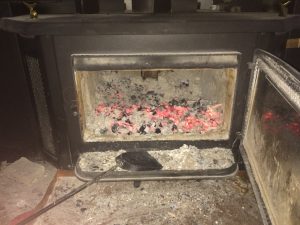
Lame morning wood in the Pacific Energy Summit. A big bank of hot and cold coals raked forward to the front, the single source of air. This is its usual incomplete burn.
Pacific Energy Summit after a full burn and coals raked forward. An efficient wood stove will burn wood down into ash quickly. The Summit is so grossly inefficient that wood turns to a thick bed of coals that smothers the one single air intake and produces very little heat.
Who, Me? No, You!
America has been in the grip of moral relativism since the 1960s, and nowhere is this corrosive belief system more evident than among Politicians-Gone-Wild who get caught.
Pennsylvania’s Attorney General Kathleen Kane was just found guilty on all counts, including perjury, and her answer (she has been consistent on this from the beginning of her investigation) is something like “it is not my fault, I am the victim, everyone is out to get me, it’s not fair, and everyone does bad things so my bad actions are no worse than anyone else’s so I am therefore not guilty.”
This “Everybody does it, so I am not guilty” mindset has now filtered down from guilty politicians to nearly everyone in America. Seems to be almost a lifestyle, where people take whatever they want or think they can get away with, and then cry foul when they are caught and held accountable in even small ways.
Basic examples found daily in the news include shoplifters who then destructively run amok in the store they are caught in, decrying their “unfair” treatment by causing thousands of dollars in damage to prove their aggrieved status.
The most egregious example of this is the Black Lives Matter movement, where mostly hardened crooks are elevated to innocent hero status in the effort to attack civilization and the citizens who undergird it, our wonderful police officers.
More common is the trespassing for firewood theft and recreation that I frequently experience on properties we own or manage.
One guy had his teenaged children riding their ATVs on our property, and when I finally begged him to make them stop, his response was “I can’t control them.” Never mind that he had put up so many No Trespassing signs on our common boundary, and quite a few were way over that boundary deep into our land, that you could not look through the woods without seeing a sea of yellow marring the scenic beauty. In other words, he zealously guards against anyone trespassing on his land, but he casually lets his people trespass on our land, and makes no real effort to stop it.
Recently I received a brutal call from an angry local man I do not know, who really chewed me out, calling me every bad name imaginable. He ended his tirade with “A lot of people out here in the valley hate you.”
Despite efforts to have a lucid conversation with the man and inject actual facts to rebut his wild accusations, he denounced me one more time and then hung up the phone. Sitting there contemplating this strange call, I began recounting the run-ins we have had with his trespassing and thieving neighbors. Indeed, a great many of his neighbors had attempted to steal some of our land, or were serial trespassers after recreation and deer, or were thieves stealing commercial quantities of firewood and mountain stone.
Yes, we have had run-ins with people around him, and when I investigated with one of the confessed trespassers, he informed me that the caller was one of the people we had inadvertently netted in our anti-trespassing efforts.
Ah hah! went my brain. Here we have a man who has been trespassing on our land for years, stealing from us firewood and mountain stone for business purposes, and he is mad as hell that his free gravy train has come to an end.
And in fact, this guy was not alone in his angry denunciation of his imaginary oppressor.
One of the other trespassing locals we caught stealing red-handed two and a half years ago was so mad, he began denouncing me to anyone he met. I guess this is a customary defense mechanism, where guilty people try to pre-empt any negative information about themselves, but it is remarkably brazen nonetheless. We declined to press charges against him, because he probably would have lost his job as a result. And his partner in crime, a local attorney, could have lost his law license.
None of our largesse was appreciated or rewarded by these criminals. In fact, they took it as a sign of weakness and lack of resolve, and they went on the offensive, personally maligning the person who they blamed for their misfortune. That being “caught.” No taking responsibility, no admitting guilt, no owning up to doing something wrong, but instead blaming others for their moral failures.
One of the things I dislike about one of the presidential candidates is that she has zero morals, no ethics, no moral compass. She refuses to take responsibility for her many failed policies and legal failures as a senior American official.
One of the things I like about her opponent is that he stands for basic decency, defined by weak 2016 standards, mind you, not the 1940s Norman Rockwell ways by which we used to run this country, and which I grew up with and miss very, very much.
Americans must elect political leaders who set a basic standard for good behavior, who represent a return to basic good values, and who help us get away from corrosive moral relativism, a culture eating away the foundations of human relationships.
Warmer weather can’t come too soon
What began as a happy trip to the wood shed for a load of seasoned oak in the Fall is now a crabby trudge through deep snow and ice, a drudgery opposite the cheerfulness felt with the first flames to beat back Winter’s early chill.
Spring warmth cannot come too soon. Naturally, it will arrive, melt the Arctic snow cap occupying my lawn, and probably result in some Biblical flood carrying my home down river to the Chesapeake Bay.
Speaking of floods, and flood insurance, I am hopeful that the insane congresswoman Maxcine Waters will have her bizarre legislation permanently overturned, so that people can either afford to own their homes (something she is not familiar with or supportive of) or the Federal government will buy out the landowners so the societal costs and benefits are not concentrated on just the private property owners. Government cannot change the social contract in one week. Well, under liberals it can, of course. Let’s rephrase that: Government should not restructure the social contract in such a short time that private property owners see their investments destroyed overnight. That would be good government, something unknown to Maxcine Waters and her fellow liberals.
OK, belay that last “let it snow”
Like you and most everyone I know around Pennsylvania, I feel done with the snow. Yes, did I say “let it snow” a bunch yesterday? Well, that was then and this is now. Now, we are expecting another eight to twelve inches of snow in the next day. On top of the six to eight inches of hardened crust, ice, and snow already on the ground, another foot is going to keep spring from arriving for a long time.
This much snow puts a stranglehold on our business operations. Shuts down machinery. Trucks cannot pick up, guys cannot cut, or even drive their trucks, let alone get their machines moving.
What really is telling about this cold is that at home, we have burned a solid three-plus cords of seasoned oak firewood. We may be closing in on four burned to date. We have enough to take us into the end of the longest cold winter, but that just means more work felling, cutting, hauling, splitting, and stacking. You know the old saw — “Firewood warms ya twice.” You work hard making it, and then it warms you as a fire. Indeed.
Hold on there, fellow Pennsylvanians. Spring must be just around the corner. Just a few weeks from now, the air should be in the mid-forties, smelling slightly earthy and damp, and a robin here and there will join the cardinal in the back yard. Then you know relief is upon us. Hold on. You are in good company.
Winter, I’ve just had it with you…
Normally I look forward to winter every year. Cooler temperatures, various hunting seasons, trapping, fall fly fishing to hungry trout that were laying low just weeks before….it’s probably my favorite time of year.
That said, I have just had it with winter this year. We have burned five cords of split oak firewood, which says something about how cold it was, and I am just tired of hauling wood.
Wearing wool keeps me warm and wool clothing usually comes in colors and tartans that you won’t find in other fabrics. Even when I am not out hunting, wool clothing reminds me of the season and is just so doggone warm. And now, I don’t want to see another wool shirt for a long, long time…
Snow in late March? OK, I recall casting a fly on the mid-April opening day of trout season about 28 years ago in Centre County, amid a snow squall that impeded view of the Royal Coachman that was so visible to the trout below. And my own wedding in March of 1993 happened on “the storm of the century,” which kept many of our guests and family from reaching the proceedings.
Those two events aside, I cannot think of another drawn out winter like this. Old Man Winter, I will not miss you.
What a Fall Day for Middle America
What a Fall day to remember.
Flag football with Son and his team, including a Kids vs. Parents game that the parents lost, to the kids’ supreme pleasure.
Bought and then replaced the battery in my daughter’s car.
Split the last of the oak and stacked most of it.
Gathered the loose oak bark and piled it around the magnolia tree, where Viv wants good bark mulch.
Viv clipped long grass around the stone wall out front and put away lots of lawn stuff that’s been around for a few weeks, with Nina’s help, including piles and piles of brown oak leaves.
This is the typical, pleasant life of Middle Americans all over the country on a beautiful Fall day. It’s a way of life that most Americans take for granted. It’s a way of life fully in Obama’s cross hairs, as he seeks an America where “everyone gets their fair share.” That forced redistribution of wealth is now and will continue to end the Middle American lifestyle.
How pleasing it is to see both Gallup and Rasmussen polls showing Romney pulling ahead of Obama nationally and in the swing states. Obama is claiming just seven states now, and that’s not many. This election is looking like it might be a blow-out, as Middle Americans realize just how much everything they take for granted is under assault and at risk with the Obama administration.

